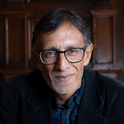What is the first news event you can recall?
I can remember the assassination of John F Kennedy—but I was nine and I am sorry to say that my main concern was that the TV programme I was going to watch was cancelled and replaced with properly respectful programming. The later assassinations of Martin Luther King and then Robert Kennedy struck me as much graver.
What is the biggest problem?
I think the biggest overall problem is climate change—which poses the risk of death and illness for so many people in the world. Immediately, I think the increasing tension between Russia, China and the west is very worrying, especially with the current tragic conflict in Israel and Palestine.
If you could spend a day in one city or place at one moment in history, what would that be?
I would just love to be in Venice during the 15th century—glamorous, wealthy, alas corrupt, but so beautiful!
Which of your ancestors or relatives are you most proud of?
I want to reclaim the history of my ancestor, the Irish Roman Catholic James Cotter, a supporter of the Jacobites (the exiled Stuarts) who was killed in 1720. He sent out his foxhounds with the white roses of Stuart kings on their collars. He was accused of the rape of his acknowledged and beloved mistress Elizabeth Squibb. She—and the jury—pleaded for mercy, but the authorities hurried through his execution even though the “stay of execution” was on the way. Historian Desmond Seward writes that the “legal murder” caused riots all over Ireland, a dozen Munster poets keening for his death.
What have you changed your mind about?
I am working on so much—racism, sexism, fox hunting, naturism and civil disobedience. I am consciously and thoughtfully opposed to the first three, consciously interested in the last two. I am inspired by whoever said your first thought is how you were raised, your second thought is what you have learned.
What is the last piece of music, play, novel or film that brought you to tears?
I’m sorry to have to answer this honestly, but I was today working on my play, Richard, My Richard, opening at the Shakespeare North Playhouse in March, and a speech about cruelty to children (and the lost princes) made me cry.
How far apart are historical fiction and historical nonfiction?
As far as the author can bear.
Have traditional historians not just ignored women in history but also mischaracterised them and their roles?
This is a very interesting question and I can’t answer it in this space. I think one of the great difficulties in writing the history of women is the long tradition of the “nature of women”, which means that historians simply cannot see women out of the stereotypical roles, or like them when they find them. As a feminist historian, it is my job to open my eyes to see what real women actually do—and not judge them.
What attracts you to certain characters, real or otherwise?
I’m in no doubt that I like women like myself!
What would people be surprised to know about you?
That I am a very solitary person—I rebuild myself by being alone in nature.
What is your favourite quotation?
“What if the Hokey Cokey is what it’s all about?”
What do you most regret?
I never confess my regrets. The things I am really sorry about belong in the early hours of the morning, between me and my conscience. They aren’t available to anyone else. I wish I had rock-solid recall of my red setter dog, who is otherwise rather perfect—if that helps?
Philippa Gregory’s “Normal Women: 900 Years of Making History” (William Collins, £25) is out now












